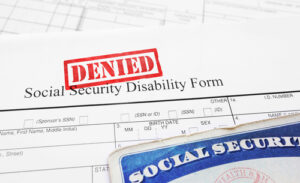A work-related accident can be painful, emotional, and confusing. In the aftermath of an on-the-job injury, you need to do everything necessary to protect yourself, which includes hiring and retaining a qualified workers’ compensation lawyer.
If you or a loved one was recently injured on the job, a dedicated workers’ compensation lawyer from Ascend Disability can help ensure that your rights are protected and demand justice. Call us today at (855) 445-9787 to schedule a free consultation.
What Is Workers’ Compensation?
Workers’ compensation is a type of insurance policy that most private employers are required to obtain on behalf of their employees. If an employee suffers a workplace or work-related injury or illness, the employer’s workers’ compensation policy provides coverage of wage loss and medical treatment regardless of who was at fault.
How Do I Know If My Injury Is Covered by Workers’ Compensation?
The eligibility of workers’ compensation claims is established based on two criteria, namely:
I. The Injury or Illness Must Arise in the Course of Employment
The injury or illness suffered by the employee must have occurred in their place of work or while carrying out work-related duties. If that isn’t the case, then it is not a valid workers’ compensation claim.
II. The Injury or Illness Must be Caused by the Employment
Just because the illness or injury occurs on the worksite, it doesn’t automatically mean the claim is valid. The injury or illness must be caused by the employment. If there aren’t any work-related factors that caused the injury or illness, the occurrence in the workplace doesn’t make it a valid claim.
What Are the Types of Workers’ Compensation Benefits?
The different types of workers’ compensation benefits in the United States include:
- Medical care
- Vocational rehabilitation
- Partial wage reimbursement
- Temporary partial disability (TPD) benefits
- Temporary total disability (TTD) benefits
- Permanent partial disability (PPD) benefits
- Permanent total disability (TTD) benefits
- Death and funeral expenses.
What Should I Do If I’m Hurt on the Job?
The steps you take after a workplace or work-related injury can either hurt or protect your workers’ compensation claim. You should:
Tell your employer you are hurt
In many states, you are legally obligated to report a workplace injury to your employers within 30 days of the accident, but preferably sooner. You or your employer then files a claim with your state’s workers’ compensation body.
Get to a doctor as soon as you can and follow your doctor’s instructions
You need to seek medical attention for your injuries immediately. You may choose your own doctor in most cases, but your employer may require you to see a specific doctor, depending on your state. Whatever doctor you see, ensure that you tell them the accident occurred on the job.
Start and keep a written record of your injury and symptoms
You need to keep an up-to-date record of your injury and symptoms, whether this is on a computer, a paper, or even your smartphone. Memories fade over time, so a helpful written record of your symptoms will help you explain the impact of the accidents when filing a claim.
Take photographs of your injury, if visible
Photos and video footage of the accident scene and your injury can be compelling evidence. It can support your compensation claim, if you decide to pursue one, or could help you defend yourself from any baseless accusations made by a dishonorable employer.
File a workers’ compensation claim with the assistance of a workers’ compensation lawyer
A workers’ compensation claim not only covers your medical bills but also a portion of back pay for when you are injured and unable to work. To help you file a workers’ compensation claim, you should consider working with an experienced lawyer such as those at Ascend Disability.
How Can a Workers’ Compensation Lawyer Help Me?
Hiring a workers’ compensation lawyer to help with your claim can be beneficial in several respects. Here are some of the ways a lawyer can help:
- Making sure that the claim is filed correctly and within the stipulated deadlines
- Gathering evidence to support your claim
- Interviewing witness present when the accident occurred to corroborate your story
- Documenting your injuries and recovery timetable
- Handling the mediation process if necessary
- Representing you in court
- Filing an appeal if necessary.
How Much Does a Workers’ Compensation Attorney Cost?
Workers’ compensation attorneys typically don’t charge anything upfront since they work on a contingency fee basis; they take their share of the money they manage to get for their client as a pre-agreed percentage, which is usually about 33 percent, but this varies depending on the case, lawyer, and location.
Steps for Filing a Workers’ Compensation Claim
Workers’ compensation claim processes generally vary from state to state. Still, regardless of where you are located, you need to get started with the claim process as soon as possible after a work-related injury or illness occurs. Here are the steps to filing a compensation claim:
- You notify your employer about the work-related injury or illness within the set deadlines.
- You or your employer should then contact your employer’s workers’ compensation insurer to submit your claim.
- You or your employer may also need to notify the workers’ compensation board in your state.
- Your employer’s workers’ compensation insurer will then review your claim and either approve or deny benefits.
- If the claim is approved, you will receive benefits and compensation.
What Responsibility Does the Employer Have in the Workers’ Compensation Process?
Employers have a number of responsibilities in the workers’ compensation process:
- Providing workers’ compensation coverage.
- Posting a notice of compliance with workers’ compensation laws in a conspicuous place at each job site.
- Providing immediate medical treatment for employees that sustain on-the-job injuries.
- Recording the fact that an employee suffered a work-related injury and keeping that record for 18 years.
- Reporting the employee’s injury to the state’s workers’ compensation body.
- Reporting changes to the employee’s pay or work status caused by the injury.
What Are My Rights After an On-the-job Injury?
If you suffer an on-the-job injury, you have the following rights:
- The right to report the workplace or work-related injury or illness
- The right to file a workers’ compensation claim without the fear of retaliation
- The right to seek medical treatment for the work injury or illness
- The right to return to work if released for work by your doctor
- The right to appeal a denied claim
- The right to legal representation when pursuing your claim.
What Can I Do If My Claim is Denied?
If you suffer a workplace or work-related injury or illness but your claim is denied, you have the right to appeal the denial. To file the appeal, you should have your lawyer talk to the insurer about the reason for the denial to know how best to approach this process.
Are There Deadlines for Filing a Workers’ Compensation Claim?
Yes. Workers’ compensation claims operate on tight deadlines. You are required to report your injuries to your employer within 30 days in most states to be eligible for benefits. After reporting the injury or illness, you will need to file a workers’ compensation claim with the workers’ compensation agency in your state within 1 to 3 years after the injury.
Can an Independent Contractor File a Workers’ Compensation Claim?
Independent contractors are generally not eligible to file a workers’ compensation claim. Employers are only legally obligated to provide workers’ compensation for employees; the workers’ compensation system does not cover vendors and contractors.
Can I be Fired for Claiming a Workers’ Compensation Claim?
No. You cannot be fired simply for filing a workers’ compensation claim because it would be an illegal act of retaliation. However, an employer can terminate employment if your injuries leave you unable to perform essential job functions.
Can I Sue My Employer?
No. Workers’ compensation is a no-fault statute. You aren’t required to prove negligence on your employer’s part, only that it was a workplace or work-related injury. Since workers’ compensation insurance exists, employees cannot sue employers for a work injury.
What Is My Workers’ Compensation Claim Worth?
The specific dollar amount of how much your compensation claim is worth will vary depending on the severity of your injuries and various other aspects of your case. In most cases, however, workers’ compensation benefits include compensation for the following:
- Medical expenses relating to the workplace or work-related injury or illness
- Scarring and/or loss of function
- Rehabilitation expenses
- Funeral expenses and survivor benefits if the workplace or work-related injury or illness resulted in a fatality.
Our Workers’ Compensation Lawyers Will Maximize Your Recovery
Sustaining an injury in the workplace can lead to confusion but you must act swiftly to ensure you obtain the compensation you deserve. Furthermore, pursuing workers’ compensation benefits is not easy.
Fortunately, the experienced workers’ compensation lawyers from Ascend Disability are here to fight on your behalf to increase your chances of a successful recovery.
Call us today at (855) 445-9787 to schedule a free, initial consultation and case evaluation.








